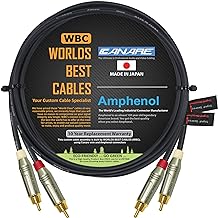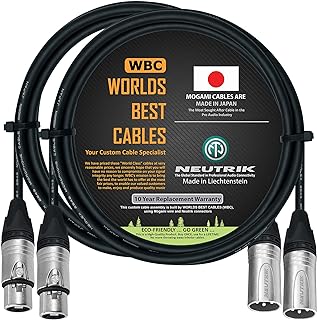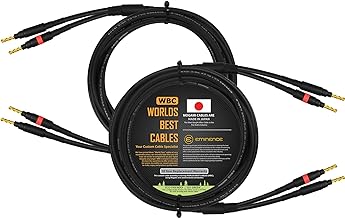5 important factors worth considering when looking for the best worlds cables speaker
When you’re looking to improve your sound system, it’s important to choose the right speaker cables. This aspect is often overlooked but it’s crucial for a good setup. The world of speaker cables can be confusing with so many options to choose from. By understanding the key factors to consider when buying speaker cables, you can improve the way you enjoy your music or home theater system. Things like material quality, gauge size, connectors, and impedance all affect the sound quality you get. By looking into these factors, you can enhance your listening experience and make a smart choice that fits your audio needs.
See our guide to the best worlds cables speaker.
Quality of materials
When buying speaker cables, it’s important to consider the materials used. High-quality cables can improve the sound of your audio system. Cables made from premium materials like oxygen-free copper or silver-plated conductors can provide better conductivity and less signal loss. These cables are durable and last longer.
While cheaper cables may seem like a good deal at first, they don’t perform as well or last as long as higher-quality ones. By choosing cables made from superior materials, you can improve your sound system and protect your investment in expensive audio equipment. In the world of audio systems, every part is important for a great listening experience. Having quality speaker cables is essential for audio perfection.
Length of cable
When buying speaker cables, consider the length carefully as it affects sound quality and performance. Make sure to pick a length that gives you flexibility in setup without hurting the signal. Using longer cables than needed can mess with the sound, while using shorter ones can limit where you put your speakers.
Finding the right balance in cable length is important for the best audio experience and keeping your cables organized. Plus, it helps your space look nicer by avoiding a mess of cables that distracts from the sound.
Take time to plan out the right cable lengths for your audio system to get the best performance and aesthetics. Remember that the length of your speaker cables is a big deal when creating a high-quality and harmonious sound system.
Compatibility with audio equipment
When buying speaker cables, it’s crucial that they work well with your audio equipment. You want to get the best sound from your high-quality speakers, so the cables you pick should go well with them. Making sure the cables match the impedance and power handling of your speakers and amplifier is important for getting the best sound possible. Also, consider the length of the cables to keep the signal strong and clear throughout your setup.
If you don’t pay attention to using the right speaker cables with your audio equipment, it can affect how well you hear the music. Choosing cables that work well with your system helps you get the most out of your audio setup and enjoy a detailed, immersive sound experience. In the end, investing in good-quality, compatible speaker cables isn’t just about making your setup look nice, but also about taking your listening experience to a whole new level.
Gauge/thickness of wire
In the world of audio systems, it’s important to think about the thickness of wire when choosing speaker cables. The right gauge can really make a difference in how your setup sounds. Some people say that wire thickness doesn’t matter much, but those who know their stuff can hear even small differences. Thicker wires have less resistance and help the signal travel better, making the sound clearer and more defined.
When looking for the right wire gauge, quality is more important than cost. Buying high-quality, thicker wires might cost more at first, but the sound improvement is worth it. Using cheap wires could make your audio system sound fuzzy and unclear. Knowing how wire thickness affects sound quality can help you get the most out of your speakers, creating detailed and immersive sound that goes beyond the ordinary.
Connector types
When you’re shopping for speaker cables, the type of connectors you choose is really important for how good your audio system sounds overall. Some people may say all connectors do the same thing, but the truth is the type of connector can affect how well the sound is transmitted and how good it sounds. If you go for good quality connectors, like banana plugs or spade connectors, you can reduce the loss of the signal and any interference, which makes the sound clearer and more accurate. It might cost more to get better connectors, but the improved sound quality makes it worth it in the end.
It’s also important to make sure the connector type matches the input/output terminals on your speakers and audio equipment to make sure they work well together. If you don’t pay attention to this, it can cause problems like impedance mismatch and your audio system won’t work as well as it could. So, it’s really important to think about the connector types when you’re buying speaker cables to get the best sound possible and make your listening experience even better. Basically, the connectors are like the bridge between your audio devices and speakers, so they’re a really important part that affects how good the sound is.
Conclusion
In a world full of choices and differing opinions, the debate over speaker cables is still heated. Some people strongly believe in using high-end cables, while others doubt their impact. One thing is for sure though: finding the perfect audio experience is a personal journey that is influenced by personal tastes. The science behind how cables are made may spark intense conversations, but the most important thing is whether the listener is happy with the sound. As technology progresses and music lovers try new things, the real beauty of music is not in the materials used for cables, but in the feelings it brings out and the connections it creates. Want more info on cap guns, check the best cap guns.


